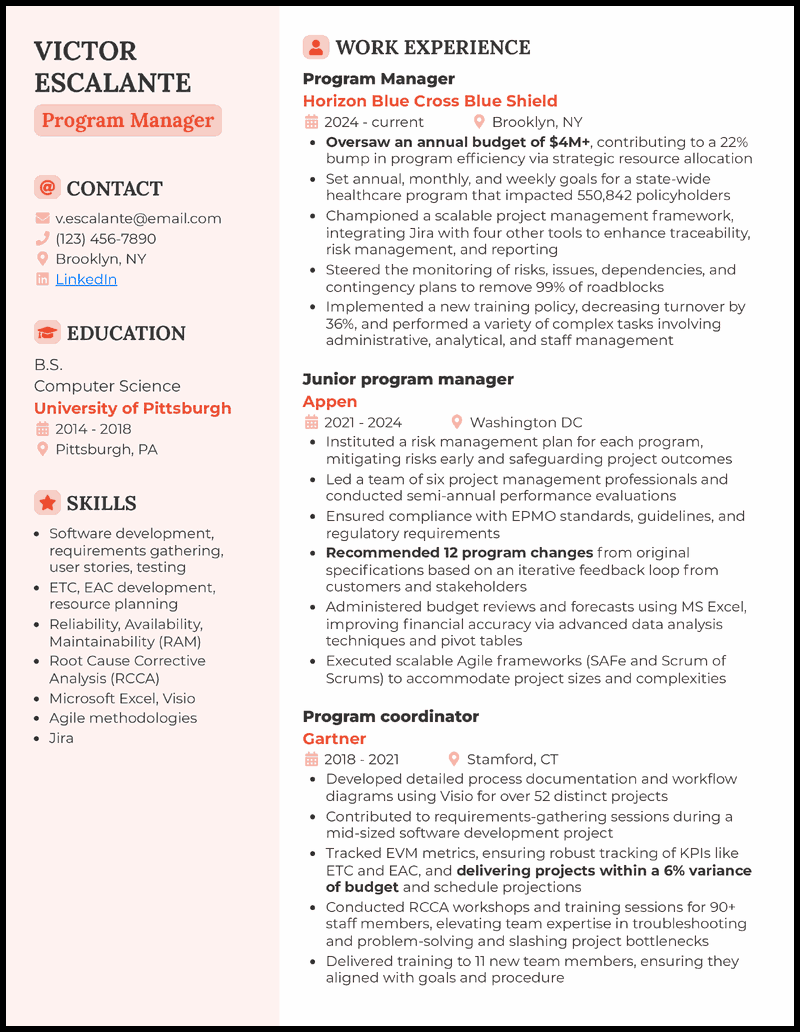You’ve got a million things to do already. You’re constantly following projects through and are now tasked with finding your next job.
It can feel disheartening staring at a blank page. Should you use ChatGPT to write a CV? And what about writing your programme manager cover letter?
Here, we’ll delve into creating an effective AI CV, where we’ve compiled some of the best programme manager example CVs that have helped candidates secure positions at top companies like Stripe and Facebook.
This guide covers:
- ↪ 15 programme manager CV samples
- ↪ Key sections every programme manager’s CV should include
- ↪ Tips to tailor your CV for different industries and roles
Numbers make an impact
- The power of numbers on a programme manager CV is not only that they make it concise but also demonstrate your impact in past roles in a profound way. That’s one great way to get noticed. To make this magic work in your favour, include realistic numbers in every other bullet point.
Enhance your value
- For your technical programme manager CV, pair your relevant skills with the impact you made, and you’re well on your way to securing the job effortlessly. Tools like Jira and Agile methodologies, along with percentages and pound amounts, demonstrate you’re up to the task.
View more technical programme manager CVs >
Use a CV summary
- You would want to showcase all those impressive achievements, but a short CV may not have that kind of space. How about encapsulating it all in a CV summary? Yes, that statement can be the icing on your senior programme manager CV to make a solid impression on your prospective employers.
View more senior programme manager CVs >
Utilise employment history
- Does your employment history include a period at a large company? You see, if you were deemed worthy of consideration by another well-known name, then chances are you’ve demonstrated your professionalism and value at the highest level.
Focus on the job specification
- Before your application lands on the desk of the actual recruiter, it has to make its way through the Applicant Tracking System (ATS). That’s something you can’t simply ignore. To outsmart the ATS, tailor your CV to the job description by ensuring your skills reflect the keywords used in the job advert.
Emphasise your education
- Emphasising education on your aerospace programme manager CV is a sure way to unlock the door to a bright and long career. So, yes, give your classroom knowledge the highlight it deserves. For instance, a bachelor’s degree in aerospace from MIT would give you a soft landing with most recruiters.
Align with company requirements
- Here, you could discuss how you managed the deployment of Microsoft Project to streamline resource allocation and contributed to savings of £200,332 in project costs over six months as the programme manager at Microsoft. Including such specifics in your Microsoft programme manager CV will give your application an edge over the competition.
Relevance and recency first
- “I’ve finally found you!” You want recruiters to utter these words by the time they’ve finished reading your principal programme manager CV. Did you know that using the reverse chronological format can make that dream a reality? Start with your most recent and perhaps most relevant role (cue principal programme manager) and go back to lead programme manager and project manager.
State your suitability
- Distinguish your Amazon programme manager from the rest by striking the right chords with a mix of dynamic language, workplace skills, and accomplishments. Employers are eager for someone who can complete the task in the best possible way, and demonstrating that you’re that type of candidate from the start will tip the odds in your favour.
Build credibility
- Want to know a little secret on how to stand out from the crowd? Add certifications to your agile programme manager CV. Are you a certified Project Management Professional or Agile-Certified Practitioner? Don’t overlook these: let them be the evidence of your professionalism.
View more agile programme manager CVs >
Display data savvy
- Your acquisition programme manager CV won’t make it beyond the first round of screening if it doesn’t highlight your data expertise. Therefore, fill your document with examples of you processing information, analysing it to make sense, and utilising it to save time, money, and increase profit margins.
View more acquisition programme manager CVs >
Verify your contact details
- Every component of your training programme manager CV could indicate you’re an ideal fit. However, if your contact section contains incorrect details, you’ll never receive any follow-up. Double-check to ensure you include the correct phone number and professional email address.
Keep it on one page
- You’re not yet on the hiring manager’s list of favourites, so don’t assume they have all the time to review your quality programme manager CV. If you really want to make an impression and get in their good books, keep it to a single page with all the essential sections (cue the header, work history, skills, and education).
Make education matter
- That degree in Information Technology carries significant weight in your cloud migration programme manager CV, and it can swiftly tip the scales in your favour. It also demonstrates that you have, at the very least, met the minimum requirements for the role.
Make no mistakes
- Want to craft a non-profit programme manager CV that works like a well-oiled machine? Proofread to ensure any grammatical mistakes such as typos, punctuation errors, and awkward phrases in your sales pitch don’t go unnoticed and leave a negative impression.
Related CV guides
How to Write a Programme Manager CV

Entering a new career or changing jobs can be overwhelming, so be sure to provide prospective employers with a well-written CV that highlights your work experience and why you would be a good hire. Also, you should properly format your programme manager CV to make it logical and readable by anyone. With the right format, you can be confident your CV won’t be discarded immediately by an ATS.
In this section, you’ll learn how to:
- Translate your responsibilities into impact-driven bullet points
- Format your programme manager CV for ATS and real-life recruiters
- Write your programme manager CV to reflect the job description and meet the employer’s needs
- Secure your dream job by showcasing your strengths and value clearly and quickly

What does a programme manager do on a CV?
On a CV, a programme manager must demonstrate the ability to oversee large-scale projects, manage cross-functional teams, plan resources, and execute action plans that deliver measurable business outcomes. Avoid listing vague responsibilities; instead, emphasise specific achievements in managing stakeholders, planning, and leading organisation-wide teams.
Typically, your responsibilities centre around:
- Setting and aligning project goals
- Managing schedules and budgets
- Leading teams from across the organisation
- Managing and mitigating risks
- Report writing and presentation

How to format your programme manager CV
Before a recruiter or potential employer reviews your CV, it must pass ATS. Therefore, formatting your CV is a crucial step in ensuring your application progresses through the entire hiring process and enhances your chances of securing the job. Use a clean layout with space for your achievements, expertise, training, and qualifications that set you apart from the rest.
It’s also essential to keep your document to one page, as hiring managers typically spend only a few seconds reviewing it before deciding whether to read the rest of it or move on to the next. If necessary, use two pages if you’re an experienced programme manager with numerous achievements in the same career path.
Reverse-chronological format vs. functional format vs. combination/hybrid format
These three formats are the most popular ones you can use when writing your programme manager CV in 2026.
- Reverse-chronological format – The reverse-chronological format places a clear emphasis on your most recent work experience, making it easier for potential employers to determine if you’re a good fit for the role.
- Functional format – The functional format prominently showcases the skills you have acquired over the years that would help you qualify for a career as a programme manager. If you have any significant gaps in your employment history, you might consider this format.
- Combination/hybrid format – The combination/hybrid format merges the functional format with the reverse-chronological format by focusing on skills and employment history.
Even though you can make a CV with any of these formats, the reverse-chronological format is the best choice. Many recruiters within the programme manager industry prefer the reverse-chronological format. Since your most recent work history is displayed first in bullet points, employers find the information easy to scan and digest.
What are the key sections for your CV?
Divide your draft into the following sections (the order may vary depending on your experience):
- Header with name, contact details, and LinkedIn URL
- Professional profile (only if necessary)
- Key skills aligned to the job advert
- Work experience accompanied by measurable results
- Education and qualifications

How to add contact and header details
Your CV’s header and contact information should be positioned towards the very top of the document. Ensure that your name is in the largest font size compared to any other words on the page. The job position you’re applying for should be placed directly under your name in a slightly smaller font. Regarding contact information, make sure to include:
- Name
- Social media links as an option
- Location (Town or city is sufficient)
- Phone number
This bold font and classic colour exude professionalism and class; Notice the size of the name in comparison to the job title below.

Position your contact information at the top with a more standard and traditional font style. Fonts like Times New Roman, Arial, and Cambria are favourites among recruiters and managers. If you want to use some colour in your CV, consider doing so modestly for your job title and name, with the font size around 20-24 points. Any headers should be closer to 14-18 points. The information placed below headers should have a font size of 10-12 points.

How to ensure your CV is optimised for ATS and recruiter’s readability
An applicant tracking system is practically essential for larger companies that receive dozens or hundreds of applications every week. Most employers sort through CVs with the use of ATS software. When a company uses ATS software, they typically place CVs through the software at the very beginning of the process. Review your CV before it meets the ATS and a recruiter. Reduce the chances of your programme manager CV being filtered by the ATS;
Some tips and guidelines for you to consider include:
- Times New Roman, Arial, Garamond, Cambria, and Calibri are ATS-preferred fonts.
- Font sizes – While your name should have a font size of 20-24, the font size for headings should be reduced. Any bullet points or similar text should be 10-12 points.
- Margins – Margins should be half an inch or one inch on all sides.
- Header names – You want the headers on your CV to guide the ATS software, which is why you should consider using all caps and bold font.
- Logical order – The reverse-chronological format mentioned previously is easy for an ATS system to scan. Begin with your most recent work experience and then go backwards.
- Skills – Ensure that your skills aren’t overly broad. The skills you include on your CV should be specific to the programme manager position.
- One page – Your entire CV should only consist of a single page.
Using our AI CV builder, you can be confident that your programme manager CV has been formatted for success.

How do you write a programme manager CV?
When you first begin writing your programme manager CV, you might find the task daunting because it is important to secure the interview. However, you can avoid these frustrations by taking the process step by step and using our free CV builder.
- Should you write a CV objective or summary?
- How to include work experience
- Most popular programme manager skills to list
- Education and specialist certificates
- When is it best to include projects, interests, and hobbies?
- Tailor your CV to each job
- Check, check, check your work

Should you write a CV objective or summary?
Although they aren’t always needed, you can use a CV objective or summary to provide recruiters with a better understanding of who you are before they read the rest of your CV.
- CV objective – CV objectives are two to three sentences that tell recruiters why you’re interested in the position and how you qualify for it. If the job is entry-level, or if you’re changing careers, an objective may enhance your programme manager CV. In any other situation, you should avoid using one.
- CV summary – This statement consists of two to three sentences that highlight your skills and demonstrate how your expertise has been utilised to achieve results in previous roles. If you’ve already had a long career of over 10 years and are applying for a more senior position, a CV summary generator can be beneficial. If you don’t have much work experience, omit a summary altogether.
Showcase your extensive work experience with a customised summary like this one.

The following are examples of poorly written objectives and summaries for a programme manager position.
Summary: Programme manager with extensive experience developing programmes of various shapes and sizes.
Objective: Seek to progress in my career by assisting companies in expanding as a programme manager.
You can easily see that these statements aren’t well-written because their information is vague and ultimately pointless. If a recruiter looks at the summary or objective before anything else, they might believe that there isn’t any substance to the rest of your CV.
The following are examples of well-written objectives and summaries for a programme manager position.
Summary: Programme manager with over 10 years of experience in developing and optimising programmes through scalable processes. Throughout my career, I’ve overseen budgets of more than $30 million and have been part of teams on projects that have generated over $100 million in revenue.
Objective: Seeking to secure a position as a programme manager with Google. As a recent graduate with two years of internship experience in this industry, I’ve developed excellent organisational, leadership, and communication skills that are ideally suited to enhancing service efficiency and delivery in relation to company performance.
These statements are detailed while also providing employers with metrics to measure the value you offer as an employee.

How to include programme management work experience
While you must highlight your past work experience, you should only include two to four roles. If you’ve had seven jobs since you were 18, you don’t need to include the first three or four. If you already have extensive experience as a programme manager, only include the roles that are relevant to the specific position for which you’re applying.

How do you write bullet points that demonstrate impact?
You should create your work experience bullet points to make this information easy to scan. Use active instead of passive voice to convey a strong and clear tone. Avoid personal pronouns as much as possible. Regarding punctuation, you can either place full stops at the end of your bullet points or leave them out entirely. However, consistency is crucial. Since you’re writing about previous work experience, always use the past tense.
A few examples of poor bullet points include:
- Managed various programmes
- Led the development of various processes
- Enhanced process efficiency
These bullet points don’t provide the recruiter with any valuable information. They won’t understand how hiring you can benefit their profit margins.
Some examples of effective bullet points include:
- Increased the lifetime value of customers from $350 to $885
- Developed project forecasts and managed to improve these forecasts by 10% in the final results
- Implemented extensive policy changes, which reduced manual work by over 1,000 hours each month
These bullet points are useful to recruiters because they offer quantifiable data that provides a clearer understanding of the value you could bring to their company.

How to measure your impact with metrics
Metrics are practically essential if you want your CV to attract recruiters’ interest effectively. Anyone who’s worked as a programme manager or in similar positions should quantify the impact they had in previous roles.
Try to include at least one metric for every two bullet points. Some examples of how to incorporate metrics into your work experience bullet points include:
- Efficiency improvements – Streamlined product development process to enhance efficiency by 20%
- Number of tickets – Resolved issues with ticket volume and response rate, which increased the weekly number of tickets by 40%
- Generated revenue – Developed a customer satisfaction programme that eventually generated more than £12 million in total revenue

What programme management skills should be on your CV?
The skills listed on your programme manager CV will play a crucial role in whether or not you secure the job for which you’re applying. When listing these skills on your CV, remember that they can be divided into hard skills and soft skills. Hard skills are essential and specific to the role you’re applying for. Conversely, soft skills are considered universal, meaning you could potentially include them on any CV.
To identify which skills you should include in your CV, look through the programme manager job description for keywords and phrases that align with your skills. Your CV should consist of five to eight skills.
Examples of hard skills for programme managers to include:
- Agile Certified Practitioner
- Root Cause Corrective Analysis
- Story Mapping
- Microsoft Excel
Some soft skills that you might include on a programme manager CV are:
- Organisation
- Task Management
- Problem-solving
- Public Speaking
A potential list of combined soft and hard skills might look like this, although we prefer to display hard skills first.


How to add education and specialist certificates
Another important section of your programme manager CV is the education you’ve received and any specialist certificates you’ve been awarded over the years. If you want to qualify for a position as a programme manager, you will likely need to earn a bachelor’s degree in computer science, business administration, or communications.
A master’s degree in business administration or project management could help you secure a position as a programme manager for a larger company. Useful qualifications include the PMP, CISM, CAPM, CISM, and CISSP, to name a few. Regarding work experience, you should have at least four to five years of experience in human resources or programme management before applying.
Capture the employer’s attention with your qualifications!


When and how to best include projects, interests, and hobbies
Most CVs shouldn’t include information about interests, hobbies, and projects. However, you might benefit from adding these sections depending on the field and your level of experience. Projects and interests are excellent if you’re a recent university graduate or someone applying for an entry-level position; projects and interests are excellent. They can help address the issue of having too much white space due to a lack of work experience. A couple of examples of interests/hobbies you could add to your programme manager CV include:
- Cooking French cuisine
- Learning new programming languages
Although programming languages may seem more relevant, cooking French cuisine could also be appropriate if you can explain how mastering international recipes and delicacies is akin to project management.
Perhaps you’ve volunteered your time to assist the university health centre with projects. If so, it might look something like this:


Should you send a generalised programme manager CV?
No. Why? A busy recruiter will likely skim it with a yawn if you send a generalised CV that could apply to any old programme manager job. To make your programme manager CV stand out, tailor and adjust the skills, experience bullet points, and objective/summary sections.

Proofread, proofread, proofread
Proofreading can be done in several ways. For one, you should carefully read through your CV several times to search for grammatical or punctuation errors. This is the simplest part of the entire CV and is often overlooked. It’s also possible you didn’t add enough information to certain sections.
Have others look at your programme manager CV, allowing you a valuable outside perspective. Take advantage of our free CV checker as well to ensure there aren’t any additional issues that you’ve missed.

Key points
Formatting and writing a successful CV takes time and patience. However, this guide should give you the tools and information you need to ensure your CV is well-written and properly formatted. Your CV should pass through the ATS without issue by highlighting your most relevant work experience and listing the hard and soft skills you possess. Congratulations on completing your programme manager CV and equipping yourself for the next exciting step in your career!
Programme manager CV FAQs

When hiring programme managers, employers are keen to bring on board a candidate with a proven track record of problem-solving to mitigate risks through innovation and sound decision-making. Other top qualities you must possess include excellent communication, teamwork, leadership, and organisational skills; all essential for successfully implementing projects.
A programme manager leads and organises teams while managing resources to oversee the success of high-level projects. Therefore, in your work experience, you must use data-backed achievements to highlight your impact in running projects. It could be a project to launch a product or improve the efficiency of systems, but you must clearly show your impact.
Look for the skills and other role-specific phrases mentioned in the job advert. Now, those keywords are needed to write your programme manager CV’s job experiences. For the skills, don’t merely list them: demonstrate how you’ve used them and the impact you’ve made in previous roles.




















